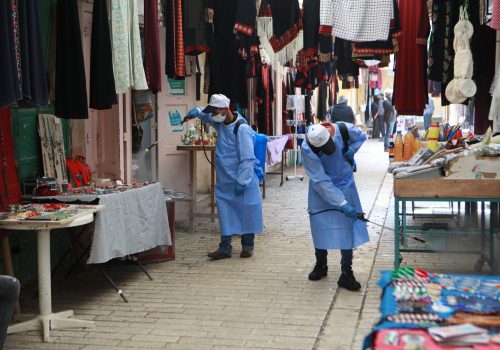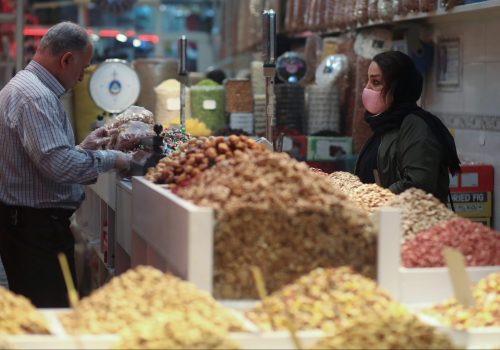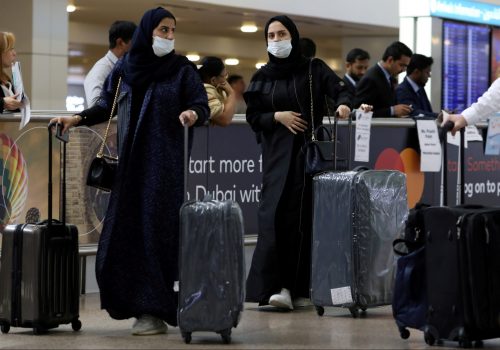Coronavirus is exacerbating the precarious situation of Syrian refugees and IDPs
While many around the world are aware of the precautions to limit the spread of the coronavirus—frequent handwashing, social distancing, self-isolating, and eating healthy—these measures are often not possible for the 6.6 million internally displaced Syrians and the 5.6 million Syrian refugees in neighboring countries, or asylum-seekers living under difficult conditions in Europe.
Among these groups, the most at risk seem to be the more than 900,000 people—including half a million children—who fled Syria’s Idlib and Aleppo governorates towards the Turkish border since December 2019 following the Russian-backed Syrian regime offensive. The humanitarian situation in northern Idlib is disastrous with many civilians sleeping in tents or in the open amidst freezing temperatures. On March 23 the first case of COVID-19 was announced in Syria, as cases continue to rise in neighboring countries.
In living conditions where often the most basic needs are unmet, it will be extremely difficult to prevent the disease from spreading among displaced Syrians unless serious measures are taken, a fear expressed by The World Health Organization (WHO). Humanitarian organizations and doctors in northwest Syria are especially troubled by the lack of hospitals, health facilities, and intensive care units should the coronavirus reach Idlib and Aleppo governorates. After attacks on hospitals and health facilities in northwest Syria, only about half of the nearly 550 health facilities are operational.
International organizations, with their limited funds, were the first ones to act in response to the worsening situation in Idlib. The International Organization for Migration (IOM) launched a $17 million strategic plan to support countries in preparing and responding to the COVID-19 outbreak, with $5 million to be used to support the entire Middle East and North Africa, Europe, Central Asia, and the Americas. The WHO is just bringing COVID-19 diagnostic kits to Idlib and Turkish officials have started an information campaign to educate Idlib inhabitants in the areas of Turkish operations on measures to prevent the spread of the virus.
In early March, Turkey’s President Recep Tayyip Erdogan discussed the humanitarian situation on the Turkish-Syrian border in Idlib, the refugee situation on the Turkish-Greek border, and joint action against the coronavirus in a meeting in Brussels with the European Commission and European Council leadership, as well as recently during a video call with leaders in Germany, France, and Britain.
At the end of February, Turkey decided to no longer prevent refugees from going to Europe following a Syrian regime airstrike which killed thirty-three Turkish soldiers in Idlib. This move was severely criticized by EU leaders and Ankara was accused of violating the 2016 EU-Turkey refugee deal. While a ceasefire in Idlib was announced by Turkey and Russia a few days later, experts highlight the fragility of the deal and argue “it is only a matter of time before the regime, Russia, and Iran move to finish the job in Idlib province.” Should offensives resume, the human tragedy will become even more serious and a new refugee flow to Europe via Turkey can be expected. One can foresee that due to coronavirus developments, Europe’s already existing unwillingness to welcome Syrian refugees can turn into a categorical refusal.
Turkey has taken an early and proactive approach to limit infection and transmission of COVID-19 through social distancing and the closing of schools and public spaces. While the numbers of confirmed cases are increasing, the Turkish minister of interior announced that as of March 20, 9,800 people were in quarantine and no cases have been found among refugees so far, including those living in Turkey, those waiting on crossing the Turkish-Greece border, and those illegally passing to Turkey from neighboring countries, as they are separately examined. All Syrians under temporary protection in Turkey—the legal status of the 3.6 million Syrians living in Turkey—have had access to the same free health care services as Turkish citizens since 2013 provided by public health institutions, for both primary and secondary care. By March 27, the Turkish government announced that refugees on the Turkey-Greece border will be temporarily settled in nine cities as a precaution against the spreading of COVID-19.
As part of its response to the coronavirus pandemic, Greece has also imposed a curfew on refugees and migrants in the Moria camp on the Greek island of Lesbos and is heavily criticized for having poor conditions. While there are no known cases of COVID-19 in the camp yet, a local Greek resident’s positive test result raised concerns among aid groups of an outbreak.
Following a UNHCR announcement that there are ten confirmed cases of coronavirus among refugees and asylum seekers in Germany, the country temporarily suspended refugee resettlement programs, including a major program as part of the 2016 EU-Turkey refugee agreement.
In the meantime, with the aim of slowing down the spread of coronavirus in Europe as well as overcoming internal border closures by several member states threatening the flow of goods and people within the bloc, EU leaders restricted most travel into Europe for at least a month.
These travel restrictions will certainly affect people’s right to access the EU’s territory and seek asylum. UN High Commissioner for Refugees Filippo Grandi stated that “If health risks are identified, screening arrangements can be put in place, together with testing, quarantine, and other measures. These will enable authorities to manage the arrival of asylum seekers and refugees in a safe manner, while respecting international refugee protection standards designed to save lives.”
On March 17, the UNHCR and International Organization for Migration announced they would temporarily suspend resettlement departures for refugees due to travel restrictions and concerns about exposure to the virus, as many countries have already significantly reduced entry into their territories and paused resettlement.
Another concerning issue is the unverified accusation that refugees and migrants are spreading the virus made by far-right groups and politicians in some European countries. This risks increasing the existing anti-migrant sentiment in Europe and stigmatizing migrants in Europe even more and preventing them from applying for treatment if they were to catch the virus.
As the countries across the world attempt to grapple with the unfolding pandemic, there is a real risk of overlooking the situation of refugees, who due to their living conditions are among the most vulnerable to a serious outbreak. The pandemic comes at a particularly precarious time as the future of Idlib and the EU-Turkey migration deal are in doubt. The international community, particularly the EU, have a responsibility to increase its humanitarian assistance and share the burden with neighbors and within the bloc to host refugees and process asylum claims in line with international and EU law. They should also ensure proper treatment and procedures are in place to treat possible coronavirus cases among asylum seekers. Time is of the essence, and the necessary measures should be taken by the international community in the fastest way in order to not exacerbate the already precarious situation of Syrian IDPs and refugees.
Pinar Dost is deputy director of Atlantic Council in Turkey. Follow her on Twitter: @pdosting.
Further reading:
Image: An internally displaced Syrian girl wears a face mask as members of the Syrian Civil defence sanitize the Bab Al-Nour internally displaced persons camp, to prevent the spread of coronavirus disease (COVID-19) in Azaz, Syria March 26, 2020. REUTERS/Khalil Ashawi


